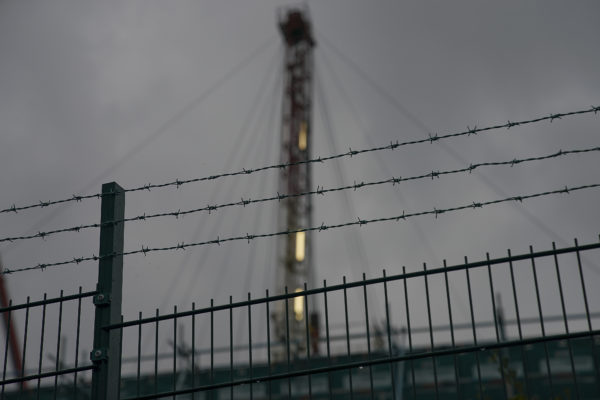Most fracking blocks compromised by new regulations, analysis shows

The vast majority – 97% – of potential fracking blocks in England would be at least partially affected by new regulations aiming to protect sensitive areas, according to an analysis by Greenpeace.
A separate data analysis by the Guardian showed that by area, 39.7% of the land in England offered for shale exploration by the government would be off-limits to fracking.
Last week, the House of Commons rejected a moratorium on fracking, but agreed to conditions from Labour banning fracking in national parks, Areas of Outstanding Natural Beauty (AONBs), Sites of Special Scientific Interest (SSSIs) and some groundwater protection zones. The revised bill now awaits a vote in the House of Lords.
Last year, the Department of Energy and Climate Change (DECC) offered up blocks for tender for unconventional fossil fuel exploitation, including fracking. Details of successful bids have not yet been published.
But because the new blocks would mean that around half of Britain is available for oil or gas exploration, Greenpeace found significant overlap with sensitive areas.
Water zone overlap
Of the 931 blocks that lie within England, 416 – almost 45% – would be significantly affected by the regulations – meaning that at least half of their area is covered by a national park, SSSI, AONB, groundwater protection zone, or some combination of the four.
Of these 416 blocks, 68 appear entirely off limits for drilling, overlapping completely with sensitive areas.
The analysis also found that 489 of all blocks in England would be partially affected, meaning that up to half of the block is registered as an environmentally sensitive area that could not be legally fracked, if the amendments pass the House of Lords vote.
Just 26 blocks – less than 3% of all English blocks – contained no regulated areas at all and would be entirely frackable under the new laws.
Similar overlaps may be expected in Wales, however the analysis only looked at England because data sets on Wales’ AONB and SSSIs were not immediately available. Scotland was excluded because of the recently announced moratorium on shale gas exploration.
Greenpeace took data from the Environment Agency on Groundwater Source Protection Zones (including inner and outer groundwater zones, as well as total catchment area), and data from Natural England on England’s national parks, AONBs and SSSIs. The data was overlaid onto a map created from DECC’s 14th licensing round block data.
The blocks were examined individually to ascertain how many would be affected by the new regulations. We broke them down into four categories: wholly covered by sensitive areas, significantly covered (more than 50%), partially covered (anything from a small speck up to 50%) or not at all covered.
In a short emailed statement, DECC confirmed that any new permits to frack in these blocks would be affected by new legislation. The statement also stressed that, in addition to the licenses that have been tendered and are yet to be announced, separate and additional permits must be obtained before fracking can begin.
Impact on 14th round
“The licences do not give permission for any operations,” read the statement. “No new licences have yet been awarded under the 14thRound, but when they are, any exploration or production projects subsequently brought forward will be subject to the requirements of the new legislation.”
There is also controversy over exactly what is covered by Labour’s amendment to the fracking rules. The party insists it includes all three levels of “groundwater protection zones” identified by the Environment Agency. Because the amendment didn’t specify any particular zone saying simply “within the boundary of a groundwater source protection zone” that is the basis of this analysis.
However speaking to the Telegraph government sources insisted it applied far more narrowly – potentially reducing the impact of the rule changes. The issue is likely to be clarified after the legislation reaches the lords.
DECC did not comment on whether there was a chance that the 14th round of bidding might have to be scrapped and rerun, if the legislation goes through.
But certainly, if passed, the rules will add an additional layer of complexity to the industry, and will not be welcomed by companies who bid on exploration rights.
Additional reporting by Zachary Davies Boren

